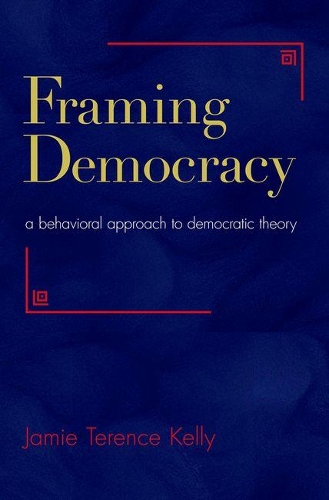
Framing Democracy: A Behavioral Approach to Democratic Theory
(Hardback)
Publishing Details
Framing Democracy: A Behavioral Approach to Democratic Theory
By (Author) Jamie Terence Kelly
Princeton University Press
Princeton University Press
26th November 2012
United States
Classifications
Tertiary Education
Non Fiction
Political structures / systems: democracy
Behaviourism, Behavioural theory
321.801
Physical Properties
Hardback
168
Width 152mm, Height 235mm
425g
Description
The past thirty years have seen a surge of empirical research into political decision making and the influence of framing effects--the phenomenon that occurs when different but equivalent presentations of a decision problem elicit different judgments or preferences. During the same period, political philosophers have become increasingly interested in democratic theory, particularly in deliberative theories of democracy. Unfortunately, the empirical and philosophical studies of democracy have largely proceeded in isolation from each other. As a result, philosophical treatments of democracy have overlooked recent developments in psychology, while the empirical study of framing effects has ignored much contemporary work in political philosophy. In Framing Democracy, Jamie Terence Kelly bridges this divide by explaining the relevance of framing effects for normative theories of democracy. Employing a behavioral approach, Kelly argues for rejecting the rational actor model of decision making and replacing it with an understanding of choice imported from psychology and social science. After surveying the wide array of theories that go under the name of democratic theory, he argues that a behavioral approach enables a focus on three important concerns: moral reasons for endorsing democracy, feasibility considerations governing particular theories, and implications for institutional design. Finally, Kelly assesses a number of methods for addressing framing effects, including proposals to increase the amount of political speech, mechanisms designed to insulate democratic outcomes from flawed decision making, and programs of public education. The first book to develop a behavioral theory of democracy, Framing Democracy has important insights for democratic theory, the social scientific understanding of political decision making, economics, and legal theory.
Reviews
"This is an interesting new area of research that has not previously received any sustained treatment in the literature on normative democratic theory... The book is clearly and tightly written. Kelly's discussions of the philosophical relevance of empirical findings are especially thoughtful. His command of the empirical literature on framing effects is impressive."--Christian Schemmel, Notre Dame Philosophical Reviews
Author Bio
Jamie Terence Kelly is assistant professor of philosophy at Vassar College.
